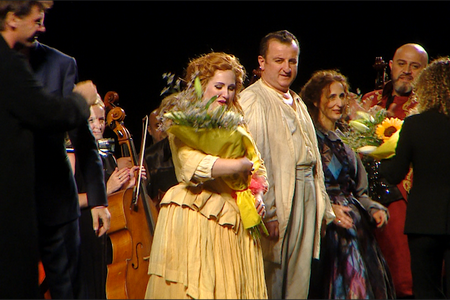Tbilisi opera troupe delights Festival Puccini crowds in Italy

Tbilisi’s state opera troupe has drawn plaudits from the Italian media for its first show in this year’s Festival Puccini on Thursday.
The company of the Tbilisi Opera and Ballet State Theatre — led by its soloists and also involving the choir and orchestra from the venue — went on stage at the event hosted in Torre del Lago in Italy’s north-west.
The performance of Manon Lescaut entertained the crowds at the festival with talents of a roster that included Georgian soprano Makvala Aspanidze, tenors Giorgi Oniani, Paata Sukhitashvili and Anzor Pilia as well as bass Gocha Datusani.

Makvala Aspanidze and Giorgi Oniani perform at the festival on Thursday. Photo: Tbilisi Opera and Ballet State Theatre.
With the line-up involving singers of the Tbilisi company and invited Georgian artists, the selection also featured soloists and actors of the Puccini academy, while the choir was led by Avtandil Chkhenkeli.
Italy’s La Gazzetta di Viareggio newspaper said the show had "made it clear” that work of famed composer Puccini was popular back in Georgia while also praising the cast for their effort that deserved "high acclaim”.
The Tbilisi troupe will appear before the festival audience in two other productions before the event comes close in August.

The Georgian singers will be involved in two more shows before the event comes to close. Photo: Tbilisi Opera and Ballet State Theatre.
In Turandot, their appearance will be broadcast live to viewers of Canale 5 TV, while the July 27 show of La bohème will also showcase the company’s talents.
This year marks the 64th edition of Festival Puccini, which was first held in 1930 and draws tens of thousands of audience annually.
It celebrates the connection between the great composer and the town of Torre del Lago, where he arrived in the late 19th century looking for a quiet spot to inspire his creativity.
 Tweet
Tweet  Share
Share